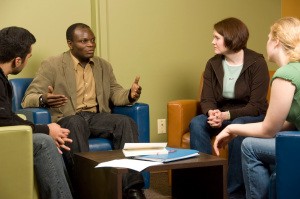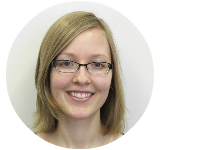
As a librarian at the U of A’s Augustana Campus in Camrose, I help students with their research on a daily basis. Most of the time, they’re looking for books and journal articles for course assignments. For example, I often receive questions like this one: “I need to find 3 peer-reviewed sources on cerebral palsy.” With such a strong focus on traditional, scholarly information sources, it can be a challenge for students to get past the words on the page in order to engage with topics on a more human, personal level.
When I was an undergraduate student at Augustana a number of years ago, I heard of a new event called the Augustana Human Library. Having no idea what to expect, I attended the human library and signed up to read a “human book” titled Guy Hard. I went into a room with a small group of my peers and listened to a transgender man share his story of fighting for acceptance and equality in a world filled with “male” and “female” checkboxes. That experience challenged my notions of gender categories and made me aware of some of my own assumptions and misconceptions. It helped me to connect an abstract, scholarly topic that I had only ever encountered in my university courses with the concrete, real-life context of what it means to be transgender, based on an individual’s lived experiences.
Since my return to Augustana as a professional librarian, I have collaborated with Augustana’s head librarian, Nancy Goebel, on the Augustana Human Library. We invite individuals who have unique or challenging life experiences, often involving prejudice and discrimination, to be “human books” and share their stories in conversation with groups of “readers.” We work with faculty to connect the human library to specific course assignments, in order to help students experience the same kind of aha moment that I had while in conversation with Guy Hard. Students frequently comment that the human library deepens their level of understanding and empathy, by exposing them to an individual’s lived experiences.
Students are often surprised to find that many of the human books they “read” are people who attend or work at Augustana or who live in Camrose. We are surrounded by individuals with incredible life experiences such as being autistic, overcoming addiction, living in poverty, or struggling with depression. Listening to their stories provides immediate, local context to important social issues. The human library helps to increase personal engagement and empathy in the world of higher education.
This semester marks the 15th Augustana Human Library. We are celebrating this milestone with a visit from Mani Mitchell, an intersex educator and advocate from New Zealand. Mani will share their* knowledge and experience through a week of events called Intersexions: Exploring the Sex and Gender Continuum. Events in Camrose will take place February 7th-11th. On Friday, February 12th, Mani will visit North Campus to present “Being Intersex: Living Outside the Binary.” For the full list of public events, visit aug.ualberta.ca/humanlibrary.
*As a person who identifies as neither female nor male, Mani prefers the use of the pronoun “they.”

Kara Blizzard — Public Services Librarian, Augustana Campus
Kara is a Public Services Librarian at the University of Alberta’s Augustana Campus Library. She is an Augustana alumna who went on to complete an MA in English at Queen’s University and an MLIS at Western University. At Augustana, Kara teaches information literacy and provides reference services in more than 20 undergraduate disciplines taught on the liberal arts campus. She is a co-organizer of the Augustana Human Library, and she coordinates the chat service for all U of A Libraries.